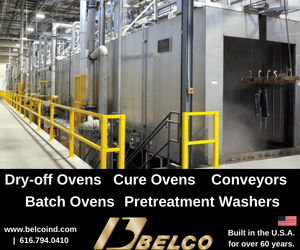Zinc-Cobalt Wastewater?
Question: One of our best customers has approached us to convert one of our acid zinc lines to zinc-cobalt.
Question:
One of our best customers has approached us to convert one of our acid zinc lines to zinc-cobalt. Technically, we know we can make this change and are comfortable in operating this bath, but we are concerned that it would render our wastewater treatment sludge hazardous. Currently, our facility performs acid zinc plating, alkaline zinc plating, cleaning and deburring, and our wastewater treatment sludge is non-hazardous. Will converting to zinc-cobalt change our sludge’s status? D.K.
Answer:
First, let’s call the material “wastewater filter press cake” since this is technically correct and sounds more environmentally friendly. Second, your question is a good one since zinc-cobalt plating is becoming more popular; I think you will like the answer.
Under EPA RCRA regulation 40CFR261.31, the F006 listed RCRA hazardous waste is defined as “wastewater treatment sludges from electroplating operations except from the following processes: sulfuric acid anodizing of aluminum; tin plating on carbon steel; zinc plating (segregated basis) on carbon steel; aluminum or zinc-aluminum plating on carbon steel; cleaning/stripping associated with tin, zinc and aluminum plating on carbon steel; and chemical etching and milling of aluminum.” Since cobalt is not specifically mentioned, one could interpret that zinc-cobalt is not excluded. However, in reviewing EPA documents, cobalt was not a hazardous constituent under consideration when the background document for the F006 listing was prepared, therefore, incorporation of cobalt into the zinc plating process does not cause the wastewater filter press cake to be a “listed” RCRA hazardous waste. As long as your wastewater filter press cake continues not to exhibit any RCRA hazardous characteristic (corrosivity, reactivity, ignitability, toxicity characteristic leaching procedure- TCLP), it will remain a RCRA non-hazardous waste. However, before proceeding, I recommend that you double check with your state EPA just to make sure that it does not regulate cobalt as a TCLP metal, which EPA does not.
Related Content
-
Top 5 Areas to Consider Automation of Plating Operations
Automation for finishing operations can lead to improvements in process time, repeatability and consistency of quality. Yet, processes that make sense to explore for these operational efficiencies may not always be readily apparent.
-
Explore Cleaning Chemistry, Metal Finishing Applications and Wastewater Treatment Solutions
Hubbard-Hall Celebrating 175 years of excellence, Hubbard-Hall presents chemistry and equipment.
-
NASF/AESF Foundation Research Project #120: Electrochemical Destruction of Perfluorooctanesulfonate in Electroplating Wastewaters - April 2022-March 2023
This NASF-AESF Foundation research project report covers project work from April 2022 to March 2023 at the University of Illinois at Chicago. The overall objective of this work is to utilize a cost-effective reactive electrochemical membrane (REM) for the removal of PFAS from synthetic electroplating wastewater. Initial results for the oxidation of PFOA with three different catalysts are discussed.












